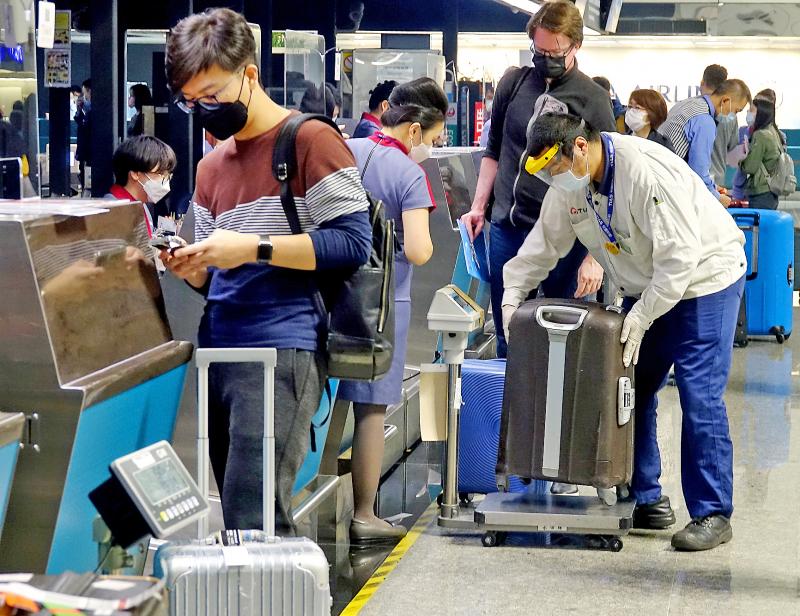EVA Airways Corp (長榮航空) yesterday announced that from June 23 it is to adopt a new baggage allowance policy for all passengers with a higher weight limit as it aims to benefit passengers and increase efficiency.
The airline currently has a two-system baggage policy: It allows passengers flying to the US and Canada to check in two pieces of baggage with a free weight allowance, while for those flying to Asia, Europe and Oceania there is also a free weight allowance, but no limit on the number of pieces of baggage.
From June 23, passengers would be able to check in two pieces of baggage, regardless of their destination, while the free weight allowance would be increased dramatically, EVA said.

Photo: Chu Pei-hsiung, Taipei Times
Currently, the maximum free weight allowance for baggage is set at 30kg for economy class passengers, but passengers under the new policy would be able to check in two pieces of baggage each with a maximum free weight allowance of 23kg, so the total maximum weight allowance would be raised to 46kg, the airline said.
For those with seats in premium economy, an intermediate class between economy and business class, the new free weight allowance would also be raised to 46kg from 35kg, EVA said.
Business-class passengers, or those flying in Royal Laurel class or Premium Laurel class, would be able to check in two pieces of baggage with a free weight allowance of 32kg per piece, a total maximum weight of 64kg compared with a current limit of 40kg, it said.
EVA also plans to offer cheaper tickets for those flying without heavy baggage, it said.
As a member of Star Alliance, the largest global airline grouping, the airline is changing its baggage policy to fall in line with other airlines in the alliance and to avoid confusing passengers, EVA president Clay Sun (孫嘉明) said.
With the new policy, it would be more convenient for passengers to connect with other airlines in the alliance, and EVA would be able to improve its airport and transit services by creating a smooth baggage-check and transfer process globally, Sun said.
China Airlines Ltd (中華航空) yesterday said that it has a two-system baggage policy: passengers flying to the US and Canada can check in two pieces of baggage, while it has a free weight allowance for the baggage of passengers flying to other destinations.
The airline has no plans to change its policy.
Tigerair Taiwan Ltd (台灣虎航), the nation’s only low-cost carrier, said that it charges different prices for different products, and products that include free baggage check-in and seat selection are more expensive than basic products.

Application-specific integrated circuit designer Faraday Technology Corp (智原) yesterday said that although revenue this quarter would decline 30 percent from last quarter, it retained its full-year forecast of revenue growth of 100 percent. The company attributed the quarterly drop to a slowdown in customers’ production of chips using Faraday’s advanced packaging technology. The company is still confident about its revenue growth this year, given its strong “design-win” — or the projects it won to help customers design their chips, Faraday president Steve Wang (王國雍) told an online earnings conference. “The design-win this year is better than we expected. We believe we will win

Intel Corp chief executive officer Lip-Bu Tan (陳立武) is expected to meet with Taiwanese suppliers next month in conjunction with the opening of the Computex Taipei trade show, supply chain sources said on Monday. The visit, the first for Tan to Taiwan since assuming his new post last month, would be aimed at enhancing Intel’s ties with suppliers in Taiwan as he attempts to help turn around the struggling US chipmaker, the sources said. Tan is to hold a banquet to celebrate Intel’s 40-year presence in Taiwan before Computex opens on May 20 and invite dozens of Taiwanese suppliers to exchange views

Chizuko Kimura has become the first female sushi chef in the world to win a Michelin star, fulfilling a promise she made to her dying husband to continue his legacy. The 54-year-old Japanese chef regained the Michelin star her late husband, Shunei Kimura, won three years ago for their Sushi Shunei restaurant in Paris. For Shunei Kimura, the star was a dream come true. However, the joy was short-lived. He died from cancer just three months later in June 2022. He was 65. The following year, the restaurant in the heart of Montmartre lost its star rating. Chizuko Kimura insisted that the new star is still down

While China’s leaders use their economic and political might to fight US President Donald Trump’s trade war “to the end,” its army of social media soldiers are embarking on a more humorous campaign online. Trump’s tariff blitz has seen Washington and Beijing impose eye-watering duties on imports from the other, fanning a standoff between the economic superpowers that has sparked global recession fears and sent markets into a tailspin. Trump says his policy is a response to years of being “ripped off” by other countries and aims to bring manufacturing to the US, forcing companies to employ US workers. However, China’s online warriors